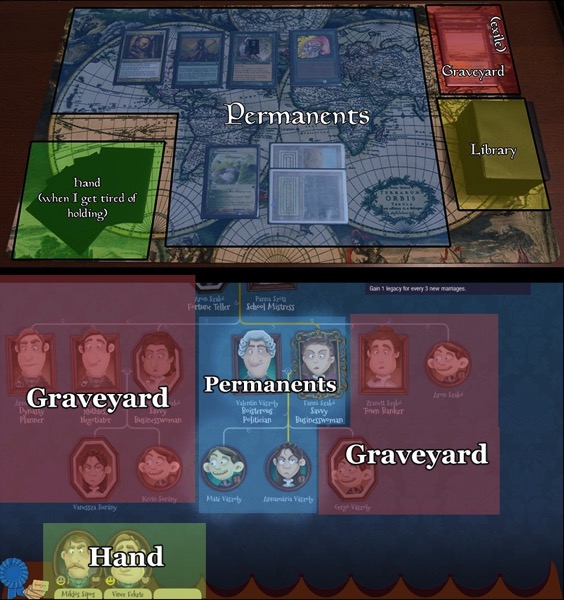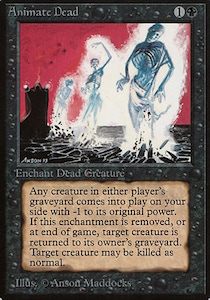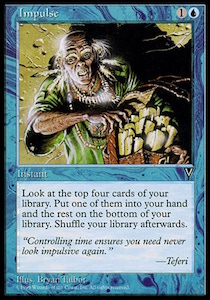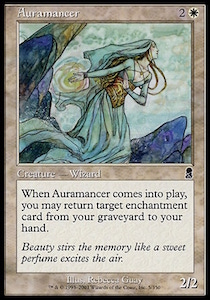In the early stages of developing a game, once I have the idea and the feelings of the game down solid, my approach is to throw everything I can think of at the game and see what sticks.

My early-in-development creative process.
During this phase I need to generate lots of different ideas because only some of them are going to stick. The more varied the better, so I like to approach my idea generation from different angles. The two most common approaches are starting from the theme, and starting from the mechanics
For example, in Lasting Legacy, we quickly came up with occupations like Family Doctor or Ball Organizer from the theme, and figured out what useful things they could do in the game (heal people, and attract new friends respectively).
We also came up with several occupations starting from a mechanics point of view. For example, we knew we wanted someone to increase the income of other people, so we came up with the Savvy Businessman occupation.
This time around I also used a third approach to generate ideas: Isomorphism.
Isomorphism is a word that comes from the greek composed of “isos” (same) and “morphe” (shape) and it means that two concepts are equal. This concept is very useful in mathematics. Imagine you have a very tough problem that you don’t know how to solve. Instead of having to go through the very difficult task of trying to solve that problem, you could instead show that it maps exactly (is isomorphic) to another problem you have already solved.
How does that help us with game design? If we can determine that our game, or at least parts of our game, map to parts of other games, we can look to see if the mechanics of those games can apply to ours.
I didn’t set out to design the Lasting Legacy this way, but it turns out there is a close correspondence between a lot of concepts in Lasting Legacy and Magic: The Gathering. That’s really good news because not only is Magic a great game, but it has been in active development for 25 years and it has explored a lot of different mechanics. So being able to draw parallels and tap into those ideas is a great resource and a very different angle of attack to a tough problem.
The mapping between Magic and Lasting Legacy goes something like this:
- Hand of cards = Friends
- Permanents = Active family tree
- Graveyard = Dead and inactive family members
- Library = Upcoming friends

I want to highlight that we’re talking about looking at concepts from another game, mapping them to our game, and then applying them, not using them straight. Those concepts couldn’t be used as it is, or wouldn’t make any sense, without the mapping from game to game. For example, in Magic: The Gathering, the player has a hand of cards but Lasting Legacy doesn’t, so the idea of discarding a card to achieve something doesn’t apply. Once we establish the mapping between the hand of cards and available friends, we could use the idea of dismissing a friend for similar purposes.
These are are some of the mechanics that we were able to map and apply to Lasting Legacy.
Bringing cards back from graveyard. Reanimating creatures has been a staple of black decks in Magic from the beginning. Thematically we could revive a dead family member, but that doesn’t fit very well with the more realistic approach of Lasting Legacy. Instead, we created a Genealogy Researcher, who can become the same occupation as a dead family ancestor.

Looking at cards from the top of the deck. Deck searching and manipulation is a very common blue Mechanic in Magic, but Lasting Legacy doesn’t really have the concept of a deck of cards, so we can’t do a lot of that. We can, however, look at the “top” X friends that would come up and pick one, which is exactly what the Dashing Socialite does. It’s a very useful occupation because it gives you a degree of filtering of your friends and reduces randomness.

Enter the battlefield effects. In Magic, many creatures have an effect that is triggered whenever they “enter the battlefield” (meaning, enter in play). This is a very useful tool, and we adopted it in Lasting Legacy. It gives you another reason to bring someone into the family, even if it’s not for their occupation or even to extend the main family branch. For example, the Charismatic Musician increases your prestige whenever he enters the family.

Blinking. Several cards in Magic allow players to “blink” permanents. That means those permanents go away and immediately enter into play again. That’s very useful to protect those permanents or re-triggering their enter the battlefield effects. We haven’t added this to Lasting Legacy yet, but it’s definitely towards the top of the lit of possibilities, especially if we end up with many other occupations that have effects when they join the family. This mechanic might make for an interesting subtheme for an expansion down the line.

There are many more mechanics that could be mapped to Lasting Legacy, but these are some of the most interesting ones we’ve done so far. If we end up making expansions, I’m sure we’ll revisit this topic as a source of new ideas and mechanics.